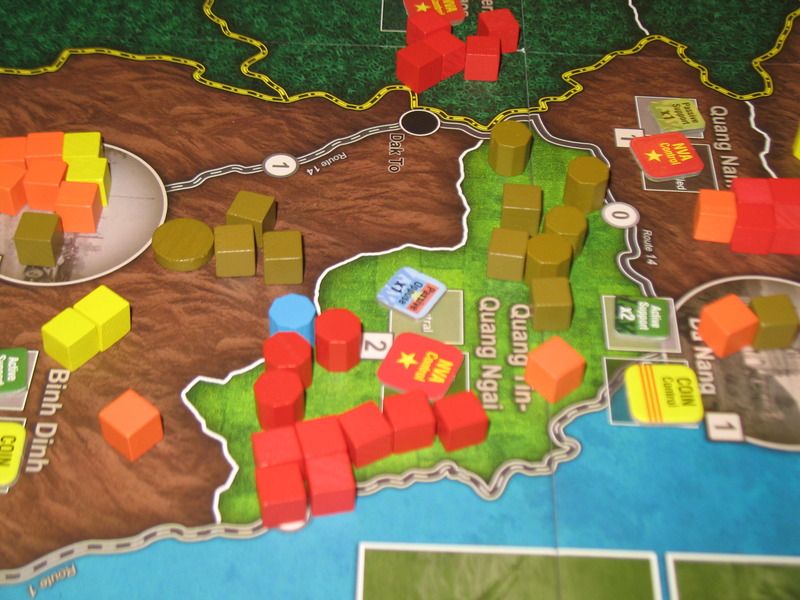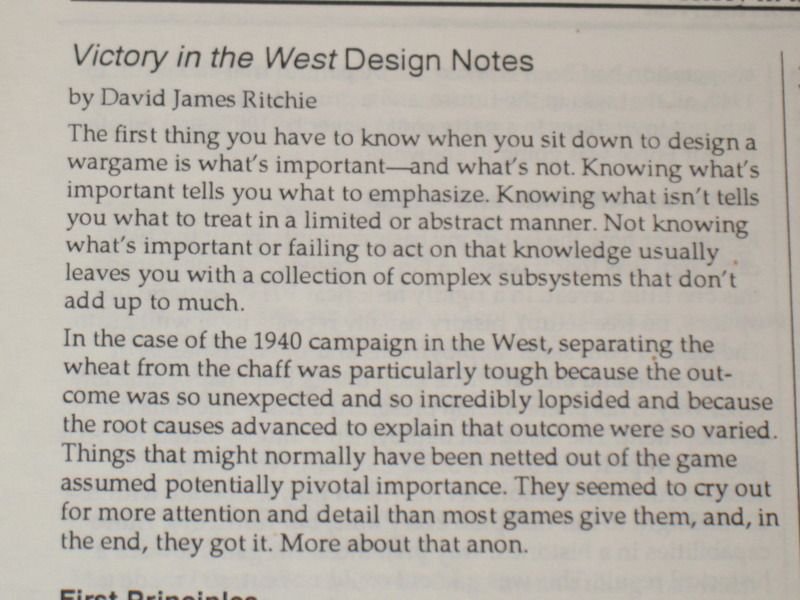WARGAME WEDNESDAY: Wargame Design, Role-Playing Games, and… (please no!) LARPS
Wednesday , 4, May 2016 Wargames 4 Comments The bombshell post of the week is over at Neal Durando’s Defense Linguistics blog:
The bombshell post of the week is over at Neal Durando’s Defense Linguistics blog:
Not only had The Forge alerted me to EMGs, it had also provided many fruitful discussions of how player expectations might best come when a game system supports those expectations. Briefly, some players simply want to win any game while others wish to immerse themselves in a temporary alternate reality. The last group, the one to which I feel closest, want to wrestle with the perversities of awesome narrative. These aren’t necessarily mutually exclusive goals, but they are a trick to manage. You certainly can get them wrong, however. The result is nervous, even angry dysfunction.
If you’ll recall, this idea of player expectations is the subject of GNS theory. Noted rpg designer Zak S. was recently calling out this “RPG theory that was nearly synonymous with tabletop RPG theory” as not only being a failure, but as a case in point that RPG theory really doesn’t exist in any meaningful way. (See here fore more on that discussion.) As a game master, I’ve never had much use for that sort of thing. Certainly, most attempts to categorize role-player and game master types fall flat with me. They just don’t seem to capture the salient features of what role-playing really is to my mind.
On the other hand… I have to admit that player expectations can cause a surprising amount of friction even in a wargame. In fact, my last session of Fire in the Lake (detailed here) would be a case study in what Neal Durando is discussing here. As skeptical as I’d otherwise be with this rather infamous “theory”, I have to admit… there’s definitely something going on here where something like it is very much relevant.
Here’s a bit of the discussion on this from my social feed:
Neal Durando: Yep, I’m hoping to show how practical application of GNS could improve learner outcomes. I know GNS might irritate you–please don’t keep it to yourself, though! It is a perfect lens for understanding dysfunction in the professional wargaming community.
Ron Edwards: The tricky part is getting past the whole immersion thing … my call is thateveryone invested in role-playing (which does not mean every person at every table) is engaged in what’s casually called immersion, which is not more sacred or difficult to understand than, more or less, “paying attention.” The question is what to do with it, and a given person’s preference is often identified (by that person) with the activity itself. The more so if that person has rarely if ever actually felt satisfied with it as a group activity – I’ve found that once a person gets his or her GNS itch really scratched, a.k.a. has actual fun, they tend to branch out and to enjoy more than one preference. But not until then.
Neal Durando: The added complexity with military games (or simulations) is that they’re closer to LARPs than anything else. In fact they’re LARPs where you get to play yourself. Ho hum. So some students seemed to have an aversion to my situations, where they were asked to fill the roles of insurgents, or former regime elements, or whomever the good guys were shooting at that year. The fact that FM3-24 specifies its objective in explicitly narrative terms–that coherent narrative is an objective in itself, was hugely helpful in getting players to think about how their actions fit an overall narrative arc. I’ll say more in a subsequent post.
Ron Edwards: Wow. All the plusses on that: “Military simulations are LARPs.” No joke and no snark either. Spot-on. Never would have seen it by myself.

—
Here’s this fortnight’s roundup of wargames posts. If you have any blogs that you think belong here, then please suggest them in the comments.
—
PaxSims (Simulations)
- Call for Panelists: Connections wargaming conference panel on “Wargaming: A Crucible for Concepts” (5/02/16)
- If the Cold War went hot in Asia (5/01/16)
- Simulation and gaming miscellany, May Day 2016 (5/01/16)
- The Game of Thrones… at the US Army War College (4/24/16)
- Matrix games for language training (4/23/16)
- Simulation and gaming miscellany, 22 April 2016 (4/22/16)
- AFTERSHOCK back in stock! (4/21/16)
—
Inside GMT (GMT Games)
- Delian League Diaries #4 (5/03/16)
- Conquest of Paradise: Solitaire Rules (5/01/16)
- Into the Wild Blue Yonder: Campaign Rules, Part 2 (4/29/16)
- Delian League Diaries #3 (4/27/16)
- Introducing Colonial Twilight: The French-Algerian War, 1954-62 (4/24/16)
- Lion of Judah Historical Background (Part 2) (4/21/16)
—
Castalia House (Wargames)
—
- Tigers on the Hunt Review (4/23/16)
- Scourge of War Waterloo – Don’t Miss the Grog Toolbar! (4/23/16)
- Graviteam Tactics Mius Front – Battle Editor (4/22/16)
—
Ludic Futurism (Brian Train)
- Busy week ahead (4/29/16)
- Struggle for Kandahar: the rest of the story (4/28/16)
- Tupamaro now available in UK/EU (4/26/16)
- Introducing Colonial Twilight on InsideGMT (4/25/16)
- “Zones of Control” is out! (4/22/16)
—
VASSAL (News)
- New Module – Ikusa (4/26/16)
- Update – Blue vs. Gray v2.51 (4/26/16)
- New Module – Ozymandia (4/26/16)
—
The Demo Gamers (David)
- The French save Monsieur Bon Bon’s chocolate factory (5/01/16)
- The fight for Monsieur Bon Bon’s factory (4/22/16)
—
War in a Box (Warren Abox)
- Field Report: Chico, California (4/25/16)
Thanks very much for picking up Ron’s comments here. As per usual when it comes to talking about RPG design I back off and claim that I don’t have a dog in that fight. Except that I kind of do. Except my dog fights only by growls and glares. GNS is hugely helpful for designers as a descriptive construction. I think it is often mistaken as a normative banner the narrative camp forms up behind. And sometimes this isn’t even a mistake. I’m much more interested in the social dynamics of nonstate actors, the adversaries force creates, and nailing learner outcomes. There is a prevailing snobbery in wargames towards RPGs that I find completely lamentable.
“Military simulations are LARPs.”
I once used my tabletop RPG experience to run my battalion through an exercise acting as the command post for a disaster. Went quite well.
GNS is not actually helpful or good. Anyone who says that has made a terrible mistake.
The simple and obvious observation that “players bring different expectations to games and the designers and GMs need to take that into account” was made LONG before GNS. Even Robin Laws and the 3fold theory people managed to notice that.
GNS’ innovations to that bone-simple observation were 2 and were bad:
-There are 3 types of expectations (ill defined by Ron) (and incorrect, because there are lots of other kinds of expectations)
-No more than one of these can be satisfied in any given instance of play.
The second thing can be disproved by watching any number of actual play videos and looking for what mixed groups of people want out of play and what they get out of it.
For a simple example: a LARPing wargamer (“simulationist”–wants to play to act as Rommel would) and a wants-to-be-=challenged wargamer (“gamist”–wants to play to win) can play together and have fun. Thus disproving GNS.
GNS popularity in parts of the RPG community has solely been due to people taking the obvious and commonplace observations it makes (which it inherited from smarter people before it) and attributing them to GNS, while ignoring the actual details of the theory.
I won’t get into an epistemology of RPGs. They’re not my specialty. The essence of theory and, especially useful theory, is articulating something that seems obvious. As hard as you play Zak, I don’t doubt for a moment that you have your own different, perhaps better, schema. Again, as hard as you play and write and care about your players’ experience, I doubt that you’re ultimately interested in this sort of theorizing. For whatever reason, I’m not aware of them. All I know is that GNS makes some people’s heads explode. (And I don’t really care why, as this almost always has something to do with a personality clash.) So–no, no–GNS was indeed helpful and good for facilitating matrix games in the context of my courses. I know GNS was helpful and good. I designed my course. I taught my course. I was there. And I read the student evaluations.
You might need to brush up on wargaming theory while you’re at it. A simulationist wants to act as Rommel would? Really? Does this mean eating the same breakfast? Or does this mean inhabiting the same decisional space with similar forces and operational challenges at hand? (Both of those goals could be termed Simulationist, I’ll warrant.) Or does it mean recreating the same doomed victories viewed through a nostalgia for a mythic Good or Competent German? (A narrative agenda.) Gamist agendas are almost perfectly transparent in the wargame world and can almost always be limited to fulfilling victory conditions.
All of the above are at play when it comes to professional military education with the added stricture that the game is played on the military’s dime, often with the fellow who signs your paycheck in the swim, and — this is most difficult to manage — among officers and enlisted all of whom constantly test each other’s professional competence, cleverness, and education. It is resolutely not about fantastic entertainment among friends. If you want to bring off such a game, you have to think carefully about how to manage those agendas, as they can rapidly sink whatever learning objectives you might have in mind. GNS proved an excellent tool for figuring out where participants were coming from.
If you have anything beyond an allergic reaction to GNS, I’d be delighted to learn more. Whatever the case, yours and Ron Edwards’s passion is instructive in itself and often leads to enabling notions.